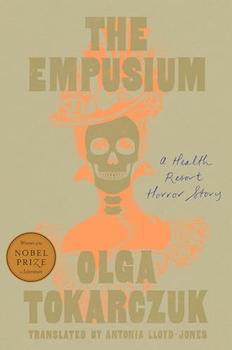Summary | Excerpt | Reviews | Beyond the Book | Readalikes | Genres & Themes | Author Bio

A Health Resort Horror Story
by Olga TokarczukTHE GUESTHOUSE FOR GENTLEMEN
The view is obscured by clouds of steam from the locomotive that trail along the platform. To see everything we must look beneath them, let ourselves be momentarily blinded by the gray haze, until the vision that emerges after this trial run is sharp, incisive and all-seeing.
Then we shall catch sight of the platform flagstones, squares overgrown with the stalks of feeble little plants—a space trying at any cost to keep order and symmetry.
Soon after, a left shoe appears on them, brown, leather, not brand-new, and is immediately joined by a second, right shoe; this one looks even shabbier—its toe is rather scuffed, and there are some lighter patches on the upper. For a moment the shoes stand still, indecisively, but then the left one advances. This movement briefly exposes a black cotton sock beneath a trouser leg. Black recurs in the tails of an unbuttoned wool coat; the day is warm. A small hand, pale and bloodless, holds a brown leather suitcase; the weight has caused the veins to tense, and now they indicate their source, somewhere deep inside the bowels of the sleeve. Under the coat we glimpse a flannel jacket of rather poor quality, slightly crumpled by the long journey and marked by tiny bright dots of some nonspecific impurity—the world's chaff. The white collar of a shirt is visible too, the button-on kind, evidently changed quite recently, because its whiteness is fresher than the white of the actual shirt and contrasts with the sallow tone of the traveler's face. Pale eyes, eyebrows and eyelashes make this face look unhealthy. Against the deep red of the western sky the whole figure gives the unsettling impression of having arrived here, in these melancholy mountains, from the world beyond.
The new arrival walks toward the main hall of the station, surprisingly large for this highland region, along with the other passengers, but unlike them walks unhurriedly, perhaps reluctantly, and is not greeted or met by anyone. Putting the suitcase down on the worn tiled floor, the traveler pulls on a pair of quilted gloves. One of them, on the right hand, is soon curled and put to the mouth to receive a volley of short, dry coughs.
The young person stoops and searches for a pocket handkerchief. The fingers alight on the spot where a passport is hidden beneath the fabric of the coat. If we focus our attention on it, we shall see the fanciful handwriting of a Galician official, who has carefully filled in the fields on the document as follows: Mieczysław Wojnicz, Catholic, student at Lwów Polytechnic, born 1889, eyes blue, height average, face round, hair fair.
The said Wojnicz is now heading for the main station hall in Dittersbach, a small town near Waldenburg. As he walks hesitantly across this tall, gloomy space, where an echo is sure to inhabit the top cornices, he can sense someone's eyes scrutinizing him from behind the ticket windows in the waiting room. Wojnicz checks the time on a large clock—it is late, his was the last train from Breslau—then, after a moment's dithering, goes out in front of the station building, where at once he is enfolded in the broad embrace of the ragged mountain horizon.
It is mid-September, but here, as the newcomer notices to his amazement, the summer is already long over and the first fallen leaves are lying on the ground. The past few days must have been rainy, because a light mist still fills most of the landscape, making an exception only for the dark lines of streams. Wojnicz's lungs feel the high altitude, which is good for his enfeebled body. He stands on the station steps, suspiciously eyeing the thin leather soles of his shoes; he will have to think about winter boots. In Lwów the asters and zinnias are still flowering, and no one has thought about the autumn yet. But here the tall horizon makes it darker, and the colors seem more garish, almost vulgar. Just then he is overcome by a familiar sense of sadness, typical of those convinced of their own impending death. The world around him feels like stage scenery painted on a paper screen, as if he could stick a finger into this monumental landscape and drill a hole in it leading straight to nothingness. And as if nothingness will start pouring out of there in a flood, and will catch him up too, grab him by the throat. He has to shake his head to be rid of this image. It shatters into droplets and falls onto the leaves. Luckily an ungainly vehicle resembling a britzka comes rolling along the road toward him. In it sits a slim, freckled boy wearing a strange outfit, reminiscent of amilitary jacket of obscure provenance—not like a Prussian uniform, which would be understandable in this place—and a military forage cap, fancifully tilted on his head. Without a word he stops in front of Wojnicz and, muttering something, takes his luggage.
Excerpted from The Empusium by Olga Tokarczuk. Copyright © 2024 by Olga Tokarczuk. Excerpted by permission of Riverhead Books. All rights reserved. No part of this excerpt may be reproduced or reprinted without permission in writing from the publisher.
Outside of a dog, a book is man's best friend. Inside of a dog it's too dark to read.
Click Here to find out who said this, as well as discovering other famous literary quotes!
Your guide toexceptional books
BookBrowse seeks out and recommends the best in contemporary fiction and nonfiction—books that not only engage and entertain but also deepen our understanding of ourselves and the world around us.